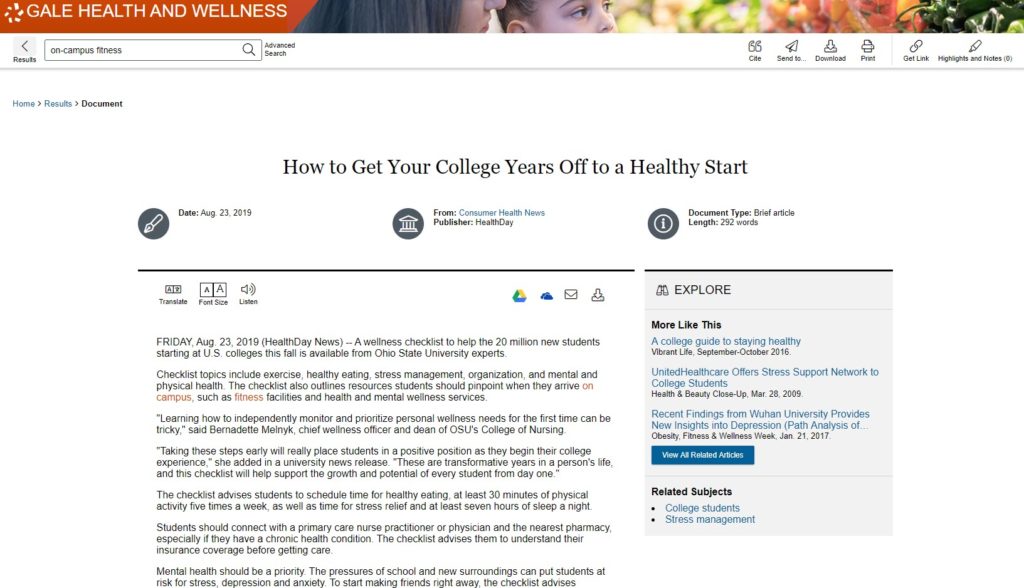| By Kimberly Hayes |
If you’re a college student, there’s a good chance you’ve experienced mental health challenges at one point or another. In fact, one in five college students lives with a mental health condition, and more than half report feeling hopeless at least once in the past year.1
It’s not hard to see why mental health problems are on the rise for college students:2 Between demanding course loads, extracurriculars, and off-campus jobs, they don’t have a lot of spare time on their hands. And when they do, there’s pressure to make the most of the college experience by socializing with their peers. As a result, basic practices like sleep drop to the bottom of the priority list, and as a result, their mental well-being suffers.
If this all sounds familiar to you, it’s time to make a change. While they won’t make college a stress-free experience, these tips will help college students balance their self-care needs with busy schedules and limited budgets:
Take Advantage of On-Campus Resources
College students don’t have to face mental health challenges alone. Seven out of 10 university presidents have allocated more funds to student mental health in recent years, expanding programs such as free mental health screenings, on-campus counseling, and web-based self-help resources.3 Students can also take advantage of peer support programs like Active Minds, a student-to-student outreach organization. If you’re ever unsure of the best place to get free or low-cost mental health support on campus, reach out to your university’s Office of Student Life or Counseling and Psychological Services center.
Live an Active Lifestyle
Most universities also include access to on-campus fitness centers in tuition and fees. Since they’re already paying for it, it behooves college students to take advantage of this valuable resource. Not only does an active lifestyle support good mental health, but many campus fitness centers include free classes in yoga, meditation, and other mind-body practices. On days you can’t find time to hit the gym, find other ways to move your body, like an under-desk elliptical that lets you get exercise and burn stress during long hours at the computer. With options as low as $40, these gadgets are surprisingly affordable even on a student’s budget.

Get Enough Sleep
Skipping sleep is the biggest way college students sabotage their mental health. Every night a they get insufficient sleep, they increase their risk of a depressed mood by 21 percent, anxiety by 25 percent, and suicidal ideation by 28 percent.4 In addition to getting at least seven hours of sleep per night,5 they should pay attention to the quality of their rest. College students should avoid caffeine late in the day and abstain from alcohol one to two hours before bedtime.6 While living in dorms they may not be able to do much about an uncomfortable mattress or noisy roommate, they can buy inexpensive items to make their room more conducive to quality sleep. A mattress topper, sleep mask, and white noise machine can make a big difference without costing a lot, especially when students turn to affordable outlets like Amazon and search for savings to apply to their purchase.
Build Healthy Relationships
Not all friendships are created equal. Friends who encourage risky behaviors or do and say things that harm a student’s self-esteem may make mental health worse, not better. Rather than forming friendships based on convenience or proximity, college students should seek out friends who share their values and support them during difficult times. On-campus groups and events are a great place to meet like-minded friends, but busy students can also turn to apps like Bumble BFF and Meetup. Not only do these apps help you meet new people, but by letting you mingle without hitting the bar scene, they’re also a great way to get social on a budget.
College is supposed to be one of the best times of your life, but sometimes the pressure to succeed academically and socially gets to be too much. When stress starts getting to you, step back and ask yourself if you’re making space for your own needs. While it can seem impossible to find the time and money for self-care in college, there are affordable resources available to help students stay well even on their limited budgets.
- “META Launches Mental Health App for College Students,” Mental Health Weekly Digest, October 14, 2019; “Just the Facts! 10 Concerning Mental Health Stats About College Students,” Innovation Educators, July 17, 2019.
- “National Survey Reveals College-Student Mental Health Diagnosis Increase,” Mental Health Weekly, November 12, 2018.
- “College Student Mental Health and Well-Being: A Survey of Presidents,” Higher Education Today blog, August 12, 2019.
- “Insufficient Sleep Linked to Mental Health in College Students and Athletes,” American Academy of Sleep Medicine, June 7, 2019.
- “How to Get Your College Years Off to a Healthy Start,” Consumer Health News, August 23, 2019.
- “The Truth About Alcohol and Sleep,” The Sleep Doctor, November 2017.
For More Resources:
“Working College Students,” Inside Higher Ed.
Active Minds chapter network
“The Best Under Desk Ellipticals (2020 Reviews),” Smart Healthy Living.
“Best White Noise Machine,” Amazon.
“5 Friendship Apps That Don’t Feel Awkward AF,” Her Campus.
“Amazon Coupons, Promo Codes & Cash Back,” Rakuten.
Meet the Author
Kimberly Hayes enjoys writing about health and wellness and created Public Health Alert to help keep the public informed about the latest developments in popular health issues and concerns.

